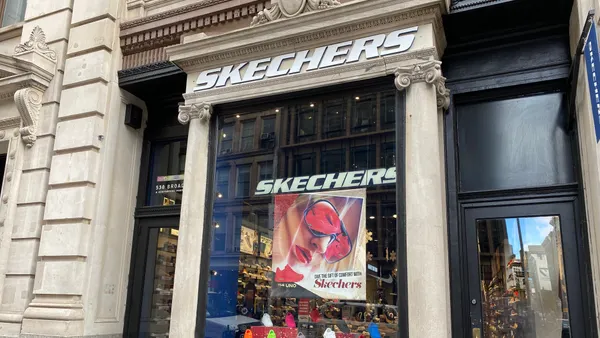Dive Brief:
- A shareholder filed a class action against L Brands over what the lawsuit alleges were false and misleading statements by the company and its executives about the retailer's financial situation, according to a complaint filed last month in an Ohio federal district court. Attorneys last week issued a press release inviting other plaintiffs to join the suit. L Brands did not immediately return a request for comment.
- At issue are public comments made in 2018 by L Brands CEO and Chairman Leslie Wexner and CFO Stuart Burgdoerfer, both also named as defendants in the suit, about L Brands' dividends to stockholders. Executives with the company, according to transcripts cited in the suit, told executives and investors that L Brands had sufficient cash and liquidity to maintain a relatively high dividend even after past sales and profit declines.
- Then, in November 2018, the intimates retailer reversed course and announced it would cut its dividend payout in half to pay down debt, sending shares down 18%, according to the complaint. It goes on to allege that L Brands had previously "traded at artificially inflated prices" because of "materially false and/or misleading statements" and factual omissions.
Dive Insight:
The suit against L Brands essentially takes issue with executives' optimistic statements about its ability to keep paying investors millions of dollars in cash in the face of declining operating performance in L Brands' key units.
The complaint retells a story that's become well known in the competitive intimates space. Sales at Victoria's Secret went into decline as upstarts like Aerie, ThirdLove and Savage X Fenty started to eat up L Brands' market share. The Victoria's Secret brand, especially, has suffered as tastes have changed and the #MeToo era cast the brand's sexualized marketing in a harsher light.
Meanwhile, the business suffered. The suit notes that while Victoria's Secret and Pink "engaged in heavy promotional activities" — discounting merchandise to try to stem the bleeding from the top-line and hold onto market share — operating income went down by more than 61% because of the discounting.
And yet, even in the face of analyst and investor questions about the dividend, L Brands kept passing cash onto its shareholders. "The company, in its history, has never reduced the dividend," Burgdoerfer said, according to the complaint. "We have the cash flow needed and cash balances, et cetera, to sustain such a dividend."
Along with profit declines, L Brands carries a big pile of debt. The company's long-term debt has hovered at around $5.7 billion since January 2016 — a figure on the order of the debt load that sent other retailers like Toys R Us and Sears into bankruptcy. L Brands, however, has still managed to post positive — though declining — operating and net income even as sales at Victoria's Secret sales fell. It's also worth remembering L Brands is still a massive company, topping more than $13 billion in sales last year.
Reducing the dividend may have been the financially sound move in that context, but the recent lawsuit argues executives should have known and said earlier that it would likely be necessary.
Such suits are common, especially against companies with falling stock prices. (Struggling apparel retailer Ascena was recently hit with one as well.) L Brands' bigger reputational danger right now may be Wexner's decades-long relationship with accused child sex trafficker and rapist Jeffrey Epstein, who died by suicide earlier this month. L Brands is currently reviewing Epstein's ties to the company.














